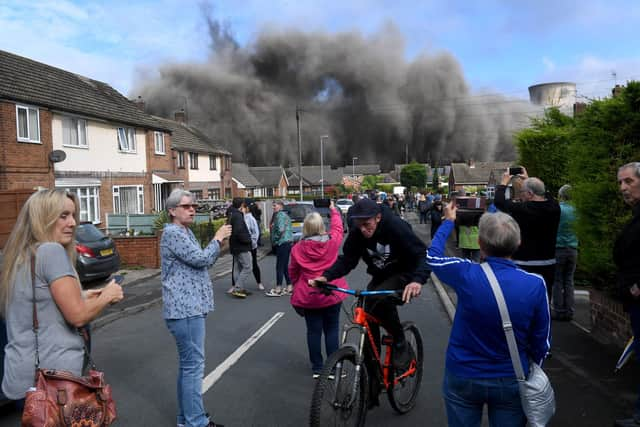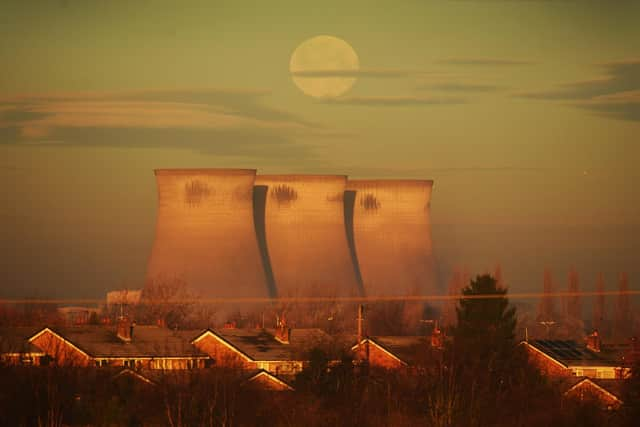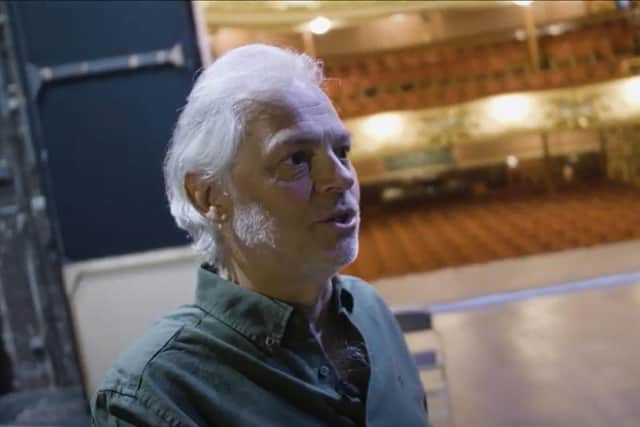Blow Down: How demolition of Ferrybridge Power Station inspired new play on life in the area
The roar as they fell in March 2022 was a poignant moment, marking both the end of an era for the West Yorkshire site and the end of the demolition of an industrial landmark which had, for decades, been a familiar sight on the skyline for the local community.
Playwright Garry Lyons could see the power station clearly from his home in Monk Fryston. He has scripted a new production to open at Leeds Playhouse this week, exploring life in the shadow of the towers. “For some years I've lived near Ferrybridge Power Station and watched its iconic cooling towers come down from close at hand.
Advertisement
Hide AdAdvertisement
Hide Ad"I thought it would be interesting to see what local people thought about the loss of such a landmark. So, I interviewed members of the community, and from the recordings developed a play that captures their hopes, dreams, fears and memories. It's a snapshot of a Yorkshire town at a particular moment, but one that I'm sure will resonate right across the north and beyond,” he says.


The former coal-fired power station was officially closed by energy company SSE in March 2016, having produced electricity for over 50 years. Its shutdown and subsequent demolition were part of what the firm described as a transition to a ‘low-carbon energy future’.
Blow Down explores the impact that Ferrybridge C’s cooling towers had on the lives of people who lived and worked beneath them. Presented by Theatre Royal Wakefield, it is based on stories collected from the community in Ferrybridge and Knottingley, telling the tale of the area from its ‘raucous’ seventies to recession and decline in the 2000s.
“[The power station] was the one local landmark that people felt put them on the map because it was so prominently placed on that junction of the A1 and the M62,” Garry says. “It was a landmark known to many people who travel along those roads and I think there was sort of a source of pride in that.
Advertisement
Hide AdAdvertisement
Hide Ad"But that was mixed with an understanding that a lot of pollution came out of those towers so the nostalgia for their loss is mixed with a bit of a feeling of relief that the area isn’t quite so polluted.


“Nevertheless as a symbol of a loss of industry in the area, I think there was a sadness to see them go. And it was a sign, if you like, of how they feel that the area has lost its way and needs an injection of investment and optimism.”
The seeds for the play first stirred when Garry became aware of the power station’s likely closure and demolition. Conversations with the community were held via video call during the Covid-19 pandemic, following the demolition of five cooling towers in two separate blowdowns in 2019.
Those he talked to included people who worked in the power station, who felt the loss perhaps more acutely than anyone else. What emerged from the interviews was a colourful story of a town that in many ways was thriving in the 60s and 70s, a time when many people worked in the coal industry.
Advertisement
Hide AdAdvertisement
Hide Ad“People were generally in work and although they might not have had an enormous amount of money they had enough to have a good time, which was available on their doorstep,” says Garry, who has been writing and making drama for 40 years.


“The first half of the play reflects a really lively local scene and the fun that people had, bearing in mind a lot of my interviewees are now in their 60s and 70s so remember their youth from that period. [They talk of] things starting to decline from the early 80s onwards with the decline of the Yorkshire coalfield and a generally a running down of services that has happened gradually since then.”
These people capture an untold story of the industrial north, says director Tess Seddon, with the demolition of the power station just one part of the picture. Their words in the the play echo the feelings of many others in northern towns which have faced decline, but compassion and community spirit shines through. “I hope people have a brilliant night out and get really drawn into these stories of real people,” Leeds-based Tess says. “But I also hope they leave the theatre knowing more about a town close to where they live and feeling inspired by the community spirit of this place.”
Using people’s own words and stories in the play was important to Garry for a number of reasons. “Although I’ve lived and worked in Yorkshire all my adult life, I don’t come from Yorkshire so I’m not part of the community. So I think it’s important for me to reflect the experiences and memories of people themselves as accurately as I can,” he says.
Advertisement
Hide AdAdvertisement
Hide Ad“Because it’s a community that feels so forgotten and isolated, there’s even more of an importance to allow them to tell their own story….If you take the trouble to listen to what people have to say, they’re endlessly fascinating and come up with stuff you couldn’t possibly invent as a writer and I find that one of the most exhilarating parts of the job...


“So much of what you see in the media and the theatre is somehow a professionalised middle class view of the world and allowing ordinary people who don’t live in that kind of bubble to speak openly is really refreshing. I like watching plays like that and I like writing them.”
Blow Down is at Leeds Playhouse from February 3 to 11 and will then tour across Yorkshire and the North East. For a full list of dates and venues, visit theatreroyalwakefield.co.uk/about-us/on-tour
